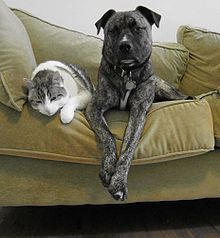WIKIPETS
What is a pet?
A pet or companion animal is an animal kept primarily for a person's company or protection, as opposed to working animals, sport animals, livestock, and laboratory animals, which are kept primarily for performance, agricultural value, or research. The most popular pets are noted for their attractive appearances and their loyal or playful personalities.

A cat and dog, two popular pets.
Contents
Legalities
Pet popularity
Choice of a pet
Overpopulation
Effects on pet's health
Effects of pets on their caregiver's health
Common types of pets
History
Pet popularity
The two most popular pets in most Western countries have been cats and dogs. In the United States, a 2007–2008 survey showed that dog-owning households outnumbered those owning cats, but that the total number of pet cats was higher than that of dogs.In 2013, pets outnumbered children four to one in the United States.
Most Popular Pets in the U.S.(millions)
| Pet | Global population | U.S. Population | U.S. Inhabited households | U.S. average per inhabited household |
| Dog | 171 | 77.5 | 45.6 | 1.70 |
| Cat | 202 | 93.6 | 38.2 | 2.45 |
| Bird | N/A | 15.0 | 6.0 | 2.50 |
| Reptiles & Amphibians | N/A | 13.6 | 4.7 | 2.89 |
| Small Mammals | N/A | 15.9 | 5.3 | 3.00 |
| Equine | N/A | 13.3 | 3.9 | 3.41 |
| Fish | N/A | 171.7 | 13.3 | 12.86 |

Kitten

Guinea Pigs

Pet Labrador

Maltese Puppy
Choice of a pet
For a small to medium-size dog, the total cost over a dog's lifetime is about $7,240 to $12,700.For an indoor cat, the total cost over a cat's lifetime is about $8,620 to $11,275.People most commonly get pets for companionship, to protect a home or property, or because of the beauty or attractiveness of the animals.The most common reasons for not owning a pet are lack of time, lack of suitable housing, and lack of ability to care for the pet when traveling.
Overpopulation
Animal protection advocates call attention to pet overpopulation. According to the Humane Society of the United States, animal shelters care for about 6 to 8 million dogs and cats each year, but approximately 3 to 4 million are euthanized.
Effects on pets health
Keeping animals as pets may be detrimental to their health if certain requirements are not met. An important issue is inappropriate feeding, which may produce clinical effects. The consumption of chocolate or grapes by dogs, for example, may prove fatal.
Effects of pets on their caregiver's health
Pets might have the ability to stimulate their caregivers, in particular the elderly, giving people someone to take care of, someone to exercise with, and someone to help them heal from a physically or psychologically troubled past.
Common Types
While many people have kept many different species of animals in captivity over the course of human history, only a relative few have been kept long enough to be considered domesticated. Other types of animals, notably monkeys, have never been domesticated but are still commonly sold and kept as pets. There are also inanimate objects that have been kept as "pets", either as a form of game, or humorously (e.g. the Pet Rock or Chia Pet).
History
Archeology suggests that dogs as pets may date back to at least 12,000 years ago.